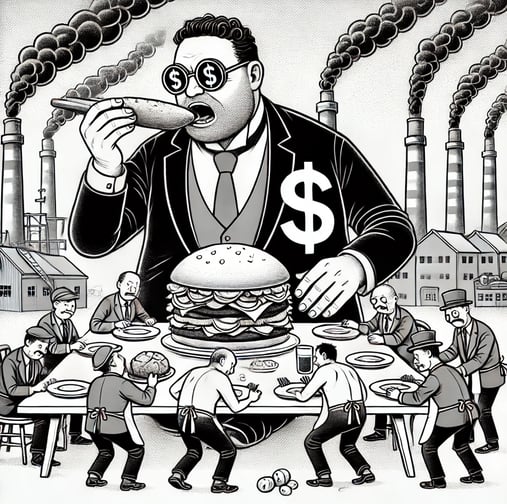Capitalism: Its Origins, Roots, and Struggle with Feudalism


Capitalism emerged as a dominant economic, social, and political system following major transformations in Europe after the Middle Ages. This shift marked the decline of feudalism and the rise of commercial activities. The bourgeoisie became the new economic power, driving industrial and technological progress. Thinkers like Adam Smith and David Ricardo played pivotal roles in defining and explaining the principles of capitalism, which revolves around free markets, private ownership of production, and the pursuit of profit.
The Origins of Capitalism and Its Struggle with Feudalism
Capitalism developed between the 15th and 18th centuries, fueled by economic and social changes that followed the Renaissance and Reformation. During this period, feudalism dominated Europe, with land-owning elites controlling resources and the peasantry tied to the land in exchange for protection and shelter.
The Collapse of Feudalism: Advancements in commerce and technology weakened the feudal system, shifting economic power to the urban bourgeoisie. This emerging class, centered in cities, became the driving force of the new capitalist economy.
Transformations in Production: As industries grew, feudal labor relationships were replaced by capitalist systems based on wage labor, where factory owners controlled the means of production and workers became the backbone of the economy.
Capitalism, Markets, and the Race for Resources
As capitalism expanded, so did the competition for markets and energy resources like coal and oil, which became critical for industrial growth.
Adam Smith: In his seminal work, "The Wealth of Nations" (1776), Smith outlined the concept of the invisible hand of the market, emphasizing how individual self-interest inadvertently promotes societal benefits. Smith championed the idea of free markets as a mechanism for balancing supply and demand without government intervention.
David Ricardo: Ricardo introduced the concept of comparative advantage, illustrating how countries benefit from specializing in the production of goods in which they have a relative efficiency, thus enhancing international trade.
Colonialism as a Tool of Capitalism
With the growth of capitalism, colonialism became a powerful tool for exploiting natural and human resources in conquered territories. European colonial powers leveraged political and military dominance to control resource-rich regions, fueling their industrial economies.
In Africa, colonial powers extracted vast quantities of minerals like gold and rubber, using force and coercion to dominate local populations.
In Asia, British colonial policies in India prioritized the production of cotton for British textile mills, undermining local industries and creating economic dependence.
Imperial Projects Before and After Capitalism
The nature of imperialism shifted significantly with the advent of capitalism
Pre-Capitalist Empires: Ancient empires like Rome and the Mongols sought territorial expansion for political and military dominance. Their economies relied heavily on agriculture and slave labor, lacking the industrial foundation seen in capitalist systems.
Capitalist Empires: With the rise of industrial capitalism, European powers like Britain and France utilized colonies as sources of raw materials and markets for manufactured goods. These empires prioritized economic exploitation over territorial control.
The Impact of Colonialism on Production Relations
Colonialism radically altered production systems in colonized regions, transforming traditional economies into dependencies serving European interests
In Africa, colonizers disrupted local economies, introducing systems focused on mining and large-scale agriculture for export.
In India, British policies forced the cultivation of cash crops like cotton, devastating local industries and creating a reliance on imported goods.
Genocide and Exploitation Under Colonial Rule
Colonialism was often accompanied by atrocities against indigenous populations
In the Americas, European colonizers decimated indigenous populations through war, forced labor, and the spread of diseases.
In the Congo, under Belgian rule, millions were killed or mutilated during the brutal extraction of rubber under the reign of King Leopold II.
Capitalism's Legacy in Developing Nations
The colonial legacy left many developing nations impoverished and economically dependent
In Africa, countries that gained independence in the mid-20th century faced challenges like weak infrastructure and limited industrial capacity.
In Latin America, centuries of resource exploitation left countries grappling with economic inequality and slow development.
